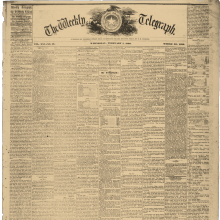March 23, 1863, Tri-Weekly Telegraph (Houston, Texas)
Editor Telegraph:-As I believe that there are many in the “Lone Star State” who like to hear from the brigade, I will occupy a short space in your columns with the account of what I saw in Richmond.
Among the first attractions in which Texas has an interest, stands most prominently the Texas Hospital, a very large building capable of accommodating 300 patients very comfortably, and 350 if put to the push. Dr. Lindly has the entire supervision, assisted by Dr. Dandridge, both from Texas. Dr. Hughes is likewise a sharer in the duties, though not as yet commissioned. Dr. Allen of Washington county, has been with the institution since its establishment, but leaves for Texas in a few days. All the offices of clerk, steward, matron, nurses, &c., are filled by Texians; Mr. and Mrs. Fenell, of Houston, holding the positions of steward and matron respectively, with great satisfaction to all concerned. The sick are delighted with this successful hospital, and I am rejoiced to see how completely all works for the general good–fulfilling to the letter the description that I gave your readers, when to Richmond last, of what we ought to have.
In this age of hero-glorifying, much encomium may be expected from the author of this letter in relation to the surgeon in charge; but I know that such would be distasteful to him, and I will say simply that he is as accomplished in his profession as he is gentlemanly in his relations with the patients, and before being assigned to our hospital was surgeon in charge of the Kent Hospital, situated on Main street, which, under his administration, was considered as among the best arranged establishments in the city–it has since been closed.
I had occasion to notice that some letters lack the friendly interest which was felt in the different regiments for those of the other regiments comprising the brigade. There was no jealousy; all had confidence in each other; and petty quarrels, frequently so common among troops, do not occur. From the Brigadier General commanding down to the private, we feel that we are all friends, and that the 1st, 4th, and 5th Texas Regiments have one aim, one home, one destiny. Desiring to see how this idea was carried out in the hospital, where all three regiments were thrown together, I was most gratified to learn from the inmates that every favor was dealt out with an impartial hand; that all shared alike in its privileges and its comforts; and I here, in a public way, beg the friends of this brigade to be thankful for the many immunities we do receive, and not let their gratitude be soured by any suspicion that one regiment has precedence before another. . . .
Among the latest intelligence we have that the Federal (abolition) officers, captured at Galveston, have the freedom of the city upon their parole–this is doubtless correct, for Gen. Magruder is competent to decide in such a case–but “that private hospitalities should be tendered to them,” seems so atrocious that one fairly doubts his senses. These men in blue coats had enlisted to bring back our country to abolition rule–had the first Manassas proved a success to them, our noble President and his Cabinet would have swung for their alleged treason. These blue coats came to Texas to overrun the country, to free the negroes, to give them arms if they would use them, to confiscate all the property of those who would not take the oath of allegiance to Mr. Lincoln’s despotism, talk of making the State of Texas a Territory–these men have received “the hospitalities of private citizens.” Where are the noble Rogers, Upton, Terry, Lubbock, Ben McColloch, Albert S. Johnson? It may be said they are not responsible, it is false, they are–they could resign their commissions, “and have no lot nor part in this matter.” We are told by Divine authority to forgive our enemies, an injunction I devoutly pray to acknowledge; but if we treat these murderers (for what else are they, if you bear in mind the history of the war) as courteously as the law directs, feed them and permit them the freedom of the town, are we not doing as much, nay more than they deserve? Oh! Houston, whose sons have spilt their blood so freely for your honor, let not your sisters, Fredericksburg and Nashville, have cause to blush for your want of sympathy in their distress. I trust that my correspondent may be mistaken, and I am earnest in my hope that he is. If he is correct, it must have been because but little thought had been paid to the terrible struggle in which we are engaged, the effects of which are everywhere visible in the mourning of the ladies, and the sorrow stricken homes.
Yours, very respectfully,
Arthur H. Edey.
